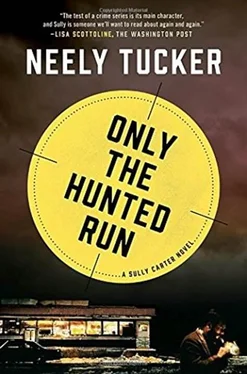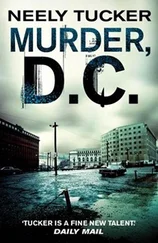“Louisiana, hayseed. I’m from Louisiana. The other side of the river. It’s different.”
“You say so.”
Sully, feeling butterflies in his gut, moved around on the backseat. How Sly came up here to see his crazy-ass uncle mystified him. The place had given him bad vibes the few times he’d set foot inside. Ghosts and lunatics, the long halls of madness. The nights in there. Jesus, what it must have sounded and smelled like back in the day. The howls. The stench.
Lionel pulled the Camaro into the main entrance and stopped alongside the security booth, letting the window down. The guard looked at him, leaned over to look in at Sly, who just looked straight ahead, tapping his right hand on his knee, and glanced at Sully, who looked out of the opposite window.
The guard did not speak. He leaned back in the booth. The gate swung open.
Unfolding before them, as Lionel slowly pulled into the property, was the wide sweep of dozens of seen-better-days brick buildings with red tile roofs. Most of them were a century old and looked like it, their façades dotted by white-brick or cement inlays arched above the doors. Windows on upper floors looked to be set in crooked frames. The doors seemed to hang on hinges gone askew. Gargoyles, their eroded stone faces more impressionistic than detailed, looked like they were about to fall off the edifices they enhanced.
Oaks and elms and fruit trees stood withering in the heat. The grass was dry, uneven, and patchy. The feds, downsizing mental health facilities after Thorazine ended the warehousing of the mentally ill, had dumped the white elephant of St. E’s on the overburdened city government decades ago, to the benefit of no one but federal taxpayers. Misery, a hopeless lack of funding, mismanagement, the exodus of talented medical staff, finger-pointing and exposés followed. Receivership, lawsuits about conditions. The patient load went from mostly well-to-do whites from across the country to impoverished blacks from D.C. Then the feds blamed the District for the horror show they had dumped in their lap… or, really, just another day in how the federal city worked.
Directly in front of them was the main administrative building. The white rectangular clock tower was perched neatly atop the center of the roof, just above the double row of white round columns. It was possible to believe it was a college admissions building on a small Southern campus, gone slightly to seed. Hitchcock Hall, the graceful old theater building, enhanced the effect: two stories, red brick and white trim, a black slate roof, the arched stone front over the door with 1908 at the top of the frame. Paned windows, set in an arch, were above that, and at the very top, the smiling face of a satyr. Two round, porthole-like windows were on the upper floor, left and right, like a set of eyes, white woodwork framing each.
Lionel idled through the grounds at the speed of a golf cart. There were only two people to be seen, both men in suits walking out of the administration building. He pulled down the ridge line to the left, the wards spreading out in wings from the center building, the windows a series of blank, unseeing eyes. They eased forward on the narrow ribbon of asphalt, the streets named for trees on the grounds: Plum, Cedar, Birch, Redwood.
And then, bringing his eyes forward, Sully saw the hulking redbrick mass of Canan Hall. It loomed directly in front of them. The building was three stories. It lay on the grounds, heavy and squat, a faceless hulk that took human beings in and never let them out. It was more than a century old. It seemed to have absorbed all the pain and violence and madness into its bricks, into the rotting wood of the fascia that lay discolored and dark at the roof line, into the peeling white paint of the eaves and ledges and doors. The windows looked like cataracts, blind and unseeing. It looked like it could take an artillery hit. It had presence. Like movie stars. Like monsters.
Lionel parked in the shade of the only tree and cut the engine. Sly didn’t move.
“Well,” Sully said.
“Hate this place,” Sly said.
A beat passed and then he opened his door, stepping out, already walking by the time Sully freed himself from the back.
“Okay,” Sly said, not slowing, “one, you got to remember is that this ain’t D.C. Jail. These patients , they got rights. They walk right up on you, too. Sniff. Put they hand on your dick.”
Sully, squinting in the harsh light. “You skeered, Sly?”
“This one dude, he come up to me one time I’m up here, he looked alright,” Sly said. “And so I say, ‘Hey, nigger what you doing today?’ You know, passing the time, waiting on Uncle Reggie to come out his room. And this dude, he says, just like a regular motherfucker, ‘I been in hell most of the day. They’s Christians and Jews. Lots of Jews. All the Negroes are burned to toast, and many people speak Chinese. The hell god says, ‘Suck my balls.’ And he goes on like that till they come get him up off me.”
“That would-”
“So I ask the orderly-guard, nurse, you can’t tell-‘What’d he do?’”
“Yeah?”
“Killed his family. Every last one. Said that they were ‘servants of Satan.’”
“Shit,” Sully said. It was starting to feel like a roller coaster ride: it looked fun from a distance. Then you got up on the thing and started thinking, hey, wait, this shit is crazy.
A pause, then he couldn’t help but ask: “That dude still in here?”
“Where else he got to go?”
“I was hoping maybe he died.”
“That’d be news. But if he did, he’s still here. The ones ain’t got no money? Bury ’em right there.”
Down the hill, far over, a small forest of tombstones on the slope, in the trees. “Talk about your life sentence,” he said.
Sly said, “Everybody up in here, it’s a life sentence, ’cause there ain’t no sentence. Your ‘indefinite hold.’ But it’s definite alright.”
They were coming up on the building before Sly spoke again, this time in the instructional. “Okay, look, going through here, signing in, all that? You make like you put your ID in the slot, but you don’t. That’s for the camera in the corner. You go past all these niggers, you don’t say shit. You walk right with me, we go up in the ward, through the control room thing they got, they buzz us in, you sit in the chair right next to me in the big TV room and you don’t say shit to nobody till I tell you. You hear?”
“Just out of curiosity, who’s your connection in here?”
“I got connections, in what you call the plural,” Sly said, “wherever I need to be. If I don’t got connections, I don’t go. You want to talk to the freak, right?”
“I do.”
“Then listen. They ain’t even gonna bring him out his room. We gonna go in there, sit and talk to Reggie. This orderly, he’s gonna walk down the hall to boyfriend’s door. You watch him. He’s going to go in and secure him. That ain’t going to be but a minute. When he steps out the door, you step in. You got two minutes to chat. The orderly’s going to wait right outside the door. Then he comes back in, party’s over, you come out. Clear?”
Sully felt the adrenaline surge through his veins. Hold it steady, champ , he thought, hold it steady. “Yeah. I mean, sure.”
***
Doors and locks, people saying no, hey, you’re not on the list, you can’t go in there, that’s a secure area, no access, back up before I make you back up, permit denied-that’s what getting past guards was. That was the deal.
And that was how you made your money in this gig: getting past the guards. What kind of reporter stayed outside the tape with the rest of the proletariat? How could you find out anything there? You had to get in.
Читать дальше








![Джон Макдональд - The Hunted [Short Story]](/books/433679/dzhon-makdonald-the-hunted-short-story-thumb.webp)



